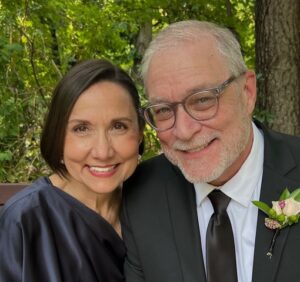by David Delp | Sep 27, 2016 | Spiritual Life
 Outcomes are not my responsibility. I am at a men’s “prayer summit” this week and I will post a few thoughts from the “summit.” This is some quick hits of things I’m thinking about this week. It is important to pull back from routine regularly and calibrate.
Outcomes are not my responsibility. I am at a men’s “prayer summit” this week and I will post a few thoughts from the “summit.” This is some quick hits of things I’m thinking about this week. It is important to pull back from routine regularly and calibrate.
This thought has come to me consistently and almost continuously over the past 24 hours, “The outcomes are not my responsibility.” The perfectionist in me wants to qualify that statement. Yes, I take responsibility for my decisions and actions, but there is so much in life I cannot control. Fear keeps me from starting, but starting is my chief responsibility. I cannot control ultimate outcomes. I can only trust that if I do the right things the right things will happen.
I always thought that if I was “good enough” and if I worked hard enough, I could keep my family safe, healthy, provided for, and we could live the life I envisioned in my head. It is my responsibility to see the vision, to start the journey, be faithful to what I hear in my heart, take action, etc., etc., but the end result is not the object, the object is day to day obedience, trust, and action. There are simply a lot of things along the way I cannot control.
Am I to take LESS action? Am I to sit passively and just LET life happen? No, I will be a man of action. I will be a starter. I will dream dreams and see visions and I will pursue them with faith and courage. But when the circumstances of life make it impossible to ZIG, I will ZAG.
[shareable]When the circumstances of life make it impossible to ZIG, I will ZAG.[/shareable]
Ok, typical of the way I think… here are three action points to help us do this:
First, Hear
My mission in life is to listen to the heartbeat of the Father and to write, speak, and do what I hear. I take the time to listen and I am committed to following the paths I believe God is leading me on. Meditation, prayer, journaling are important. Every successful person I’ve ever met has a quiet time in their daily routine to think. I use my quiet time to listen. Pacing and shouting during your prayer time is a good thing, I do it more often than you’d think, but I find that what God has to say is always more important than what I have to say. I need to listen.
Second, Trust
When I listen, and I hear, I then must trust what I’m hearing. This is cultivated. I must position myself that the outcomes are not my responsibility, but acting upon what I hear is my responsibility. If I fail to START because the end result is not guaranteed, then I will never start. I have to trust God to orchestrate the end result.
But, its not enough that I trust God… I have to trust God in me. I have to trust my relationship and my ability to hear clearly. Sometimes I get it right, sometimes I get it wrong, but I must have the COURAGE to go forward on what I sincerely believe is right. Even if I am wrong, if I proceed with a pure and sincere heart (Psalm 25), God is still able to orchestrate the right outcome.
[shareable]It is not enough to trust God… I must trust God in me.[/shareable]
Third, Act
Pull the trigger. Take action. Don’t try to do, do. If I sit around trying to clarify everything I will never take action. There is a time for waiting, a time for being certain, a time for testing the waters, a time for thinking, a time for caution, a time for observation… But, for-crying-out-loud, make a decision to pull the trigger and get on with it. You have to trust enough to get on with it.
Hey, a lot of this is self-talk. I struggle with this every day of my life.
I am emboldened when I realize the outcomes are not my responsibility. Taking action and doing what I know to do is my responsibility. I cannot foresee the unexpected. I don’t know how long I will live. I don’t know how long my loved ones will live. I do not know when tragedy will strike (again). I cannot control governments, the economy, politics, or evil people. I can control my obedience and the actions I take.
I will do my best to (1) clearly listen, then I will (2) trust myself enough to act, and then (3) I will trust God to bring about HIS outcome.
by David Delp | Sep 26, 2016 | Grief & Disappointment, Spiritual Life, Uncategorized
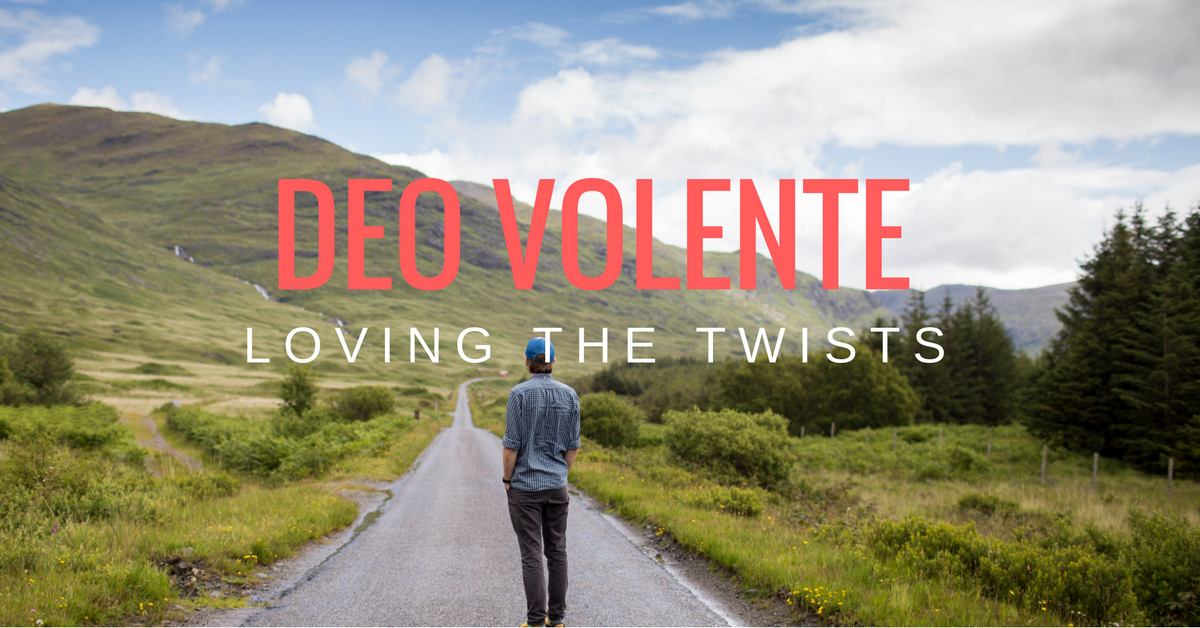
One of the keys to loving the “twists” in life is embracing their divine nature. Besides, most of the good things in life come from the “twists” in life’s road.
Deo Volente,” it is a Latin phrase meaning “God willing.” A century ago, it was common to include the initials D.V. at the bottom of a letter or invitation. The initials qualified the contents of the letter, indicating plans based upon and subservient to God’s will (James 4).
My Granny was a wiry old woman. In the middle of the Great Depression, at the age of 35, with no means of supporting herself and her four children, she buried my granddad who died in an accident as a West Virginia coal miner. They were married 17 years. She never remarried, probably never even thought about it.
To my recollection, Granny never stated her future intention, be it about going to the grocery store, sweeping the floor, or preparing a meal, without adding the phrase, “Lord willing I am going to….” “Lord willing, I’m going to make a banana pudding.” I was always certain the banana pudding was God’s will! As an ignorant theology student in college, I sometimes said to her, “Granny, it is not necessary to add ‘Lord willing’ to every statement, God doesn’t care if you make a pudding.” She was never deterred.
Now I get it.
Walking through life’s difficulties, there are days I’d like to chat with Granny. I would like to hear from her in my present context of understanding. I’d like to know what God taught her as a young mother, alone in the middle of the Great Depression. Granny somehow learned to resign herself to the will of her God and, with all of her heart and sincerity, to faithfully trust. And it was proven, her trust was not misplaced.
Now, my friends sometimes chide me for saying, “Lord willing.” They sometimes jokingly add, “and if the creek don’t rise.” I don’t care so much about rising creeks, but I do want to acknowledge God’s rightful prerogative to intervene in my plans. Sometimes I add “DV” to the bottom of communications. Deo Volente, if God wills it.
Here are five thoughts about embracing the will of God:
Boldly Pursue Life
Don’t just sit around and wait for the “will of God” to hit you in the face. Use the gifts, insights, and discernment God has given you to boldly pursue the divine future you see. Sincerely acknowledge “Deo Volente,” because reality often ends up different than imagined, but have confidence that God’s progression will bring you to a good place. Otherwise our inactivity bring paralysis.
Allow for Variances
When things turn out contrary to the way you imagined, embrace “Deo Volente”. When things turn out contrary to your plans, if I have not allowed for variances, if I have not allowed for “Deo Volente,” you will get body-slammed. Denial is a normal part of grief, and it takes many forms, but we eventually realize denial does not change reality.
Embrace the Twists
When you lay plans, acknowledge “Deo Volente.” Oddly enough, when you acknowledge such from the outset, it is easier to recognize and joyfully embrace twists in your road. The greatest joys come from the “twists.” Twists may be devastating, but more often, they are incredible blessings.
[shareable]The greatest joys come from the ‘twists’ in our journey. Twists may be devastating, but more often, they are incredible blessings.[/shareable]
Acknowledge Present Reality
Why do some Christians think it a lack of faith to acknowledge present reality? God is bigger than our reality, he can change present reality, but reality is still reality. Responsibly face the things that are. Faith speaks into existence things that are not. Speak to the desired reality while acknowledging present reality. Prayer is seeking God’s will on earth as it is in heaven (Matthew 6).
[shareable]God is bigger than our reality, he can change present reality, but reality is still reality.[/shareable]
Joyfully Desire God’s Will
I say, “Lord willing,” “Deo Volente,” “DV,” because if I make a stupid or uninformed plan, I WANT God to intervene and help me discover a better path. It takes trust, self-denial, and a bit of “crucifixion,” but His plan is always better in the end. I want God’s path, even when it looks like a path I’d rather not take.
Such is the faith taught me by a wiry little West Virginia woman who weighed less than 100 pounds, always wore her hair in a tight bun on the back of her head, who navigated losses and disappointments that I have only begun to understand.
Deo Volente. God willing.
by David Delp | Sep 12, 2016 | Spiritual Life, Uncategorized
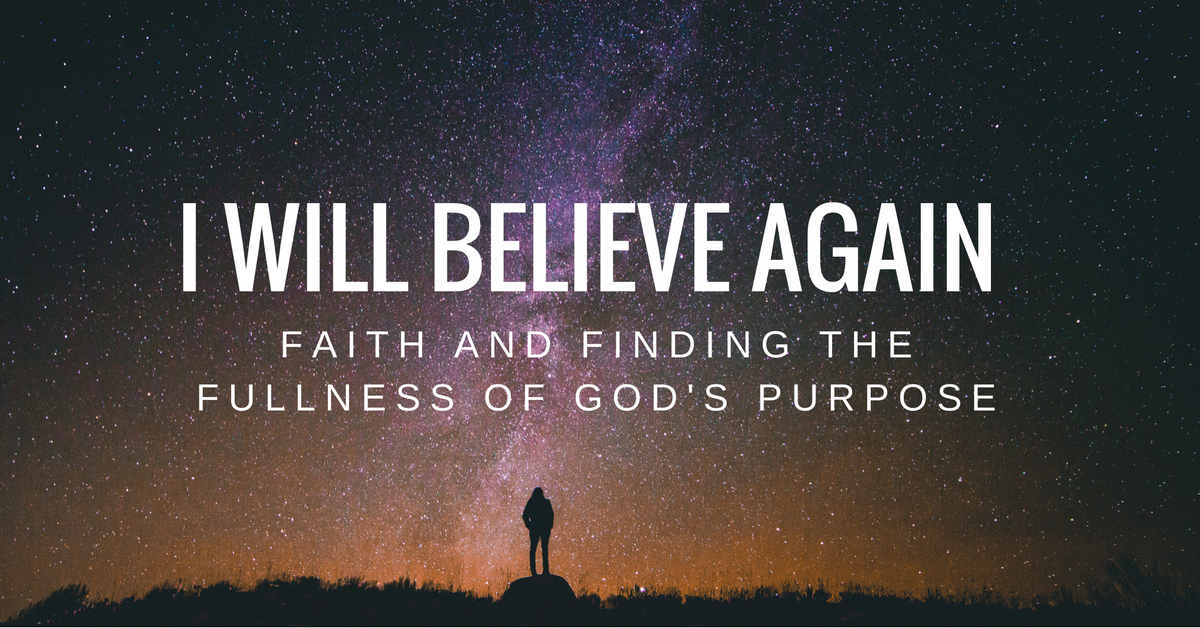 Donna and I have both had to walk through a rebuilding of our faith. Our former definition of faith was something like, “believing that God will do anything you direct him to do because you are his favorite person.” Ummm… not exactly… The Scriptures are always quite clear that we are to be seekers of God’s will and not ours—because His plan is better, even when it looks like his plan stinks!
Donna and I have both had to walk through a rebuilding of our faith. Our former definition of faith was something like, “believing that God will do anything you direct him to do because you are his favorite person.” Ummm… not exactly… The Scriptures are always quite clear that we are to be seekers of God’s will and not ours—because His plan is better, even when it looks like his plan stinks!
This isn’t a theological discussion, it is about our lives and the way we’ve grown to be at peace with something that we cannot fully understand. God is who he is, he is “I AM.” We, as the creation and not the creator, do not have the prerogative to create God in our own image, but it is ours to open our lives up to him that we may know him, as much as God is knowable, for who he is.
Some believe faith is based solely on the statement of scripture. Our experiences must be discounted in favor of scripture. If scripture says God performs miracles, then he does whether or not we ever actually see a miracle.
Others say faith is experientially based. While honoring scripture as our “all sufficient rule for faith and conduct,” our experience proves God’s miraculous ability. A person with a testimony is more influential than someone with merely an intellectual argument. A weakness of experiential thinking comes when our experiences do not jibe with our belief or knowledge. When we believe that God can perform a miracle, say… a healing, and he does not, then our experience informs us that God does not perform miracles.
Some others say that God performs miracles according to our faith, and when we ask without result the “fault” lies with us because we were not faithful enough, prayerful enough, or good enough. We didn’t pray the right way.
Yep, Donna and I have waded through all of that stuff. We’ve been on a journey of rediscovery and trust. As a result, our faith has grown to previously unknown levels. Now, rather than basing my faith on my own strength, ability, intellect, knowledge, understanding, wisdom, education, etc., my faith is based upon a simple trust in God, as it should have been all along.
I have come to think of faith on four practical levels.
Level One Faith: A Belief that God CAN Do the Miraculous
Both Donna and I grappled with faith questions as we navigated the disappointment of grief. I never deeply doubted that God could do anything, but I wasn’t sure he WOULD do the miraculous. A level one faith questions whether or not God is active on this earth. We observe pain and suffering in this world and we pose temporal explanations for the seemingly miraculous. We believe God can, but will he?
Level Two Faith: A Belief that God DOES do the Miraculous
The testimony of Scripture, the testimony of people we trust, and our own personal observations and recollections reinforce that God does do mighty things. At level two, a doubt remains as to whether or not God will move on our behalf, because we may not deserve it, but God does do miraculous things.
Level Three Faith: A Belief that God will do the Miraculous In and For Me
This has been a journey of trust. I do not know why God chooses to release his power to miraculously heal a dying person in one instance and withholds the power in another instance. I can think of a hundred reasons why he might, but I choose to make it simple—I choose to walk faithfully with God and trust him. A level three faith brings me to the place of daring to believe that not only can God do great things, and not only does he do great things, but he does great things in my life. We will not understand everything, but God is motivated by love toward us.
This third level of faith requires trust. What I see or don’t see may trouble me, but when I place my trust in God, my perspectives change and my faith stabilizes.
Level Four Faith: A Belief that God will do the Miraculous Through Me
God and I are still working on the perfecting of a level four faith in me. A level four faith is NOT about seeking the miraculous, it is about being the miraculous. It is about being an instrument in God’s hands and participating in the simple yet miraculous transformation in the world around us.
Level four faith is living in the belief that God accepts me; he actually likes me, even when I do not. He is gracious and merciful. Discovery of a level four faith opens huge doors of opportunity, because it is only when I believe, truly believe that not only will God do great things, he calls us to participate in his divine nature (2 Peter 1:4). A level four faith requires obedient trust in God.
Donna and I want you to know that when you are shaken you don’t have to be destroyed. God really does work through the tough stuff to prove himself faithful. When you’re feeling beat up, challenged, hurt, or disillusioned, dare to believe that when we trust and grow in our faith we discover that…
… God CAN do mighty things,
… God DOES do mighty things,
… God will do mighty things in your life,
… and God will do mighty things through your life so you can realize his purpose and plan for your life.
by David Delp | Sep 5, 2016 | Uncategorized
We love the thought of being in the game, but when our moment comes we shrink back because of the times we dropped the ball, the times others ridiculed us, the times when our best was not good enough. The only way we courageously take a risk is when the thought of the desired outcome motivates us beyond fear of possible failure.
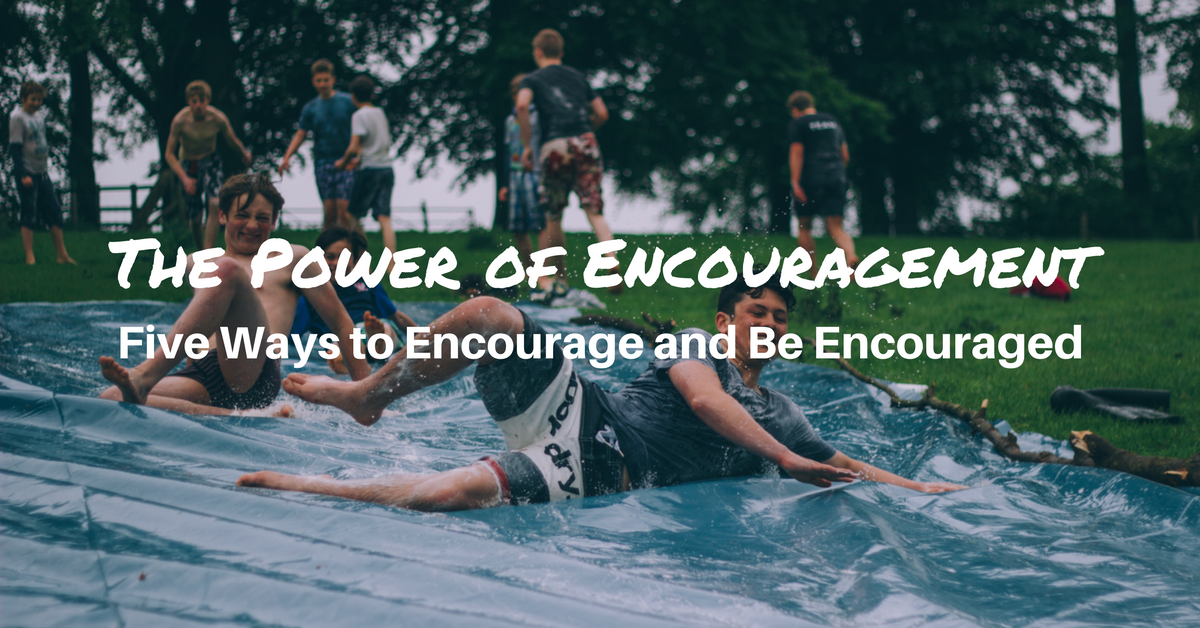
Long ago, one of my joyful duties was that of directing summer camps for children. I was thinking this morning of a little kid who came to camp one summer. I think his name was Jason. He was overweight and socially awkward; one of those kids who is not going to win a popularity contest, or any other contest for that matter. He’d already learned, by the time he was 8 years old, that when you are a short, fat little kid with a bad buzz haircut, interaction with other people can cause more pain than joy. He was adept at flying under the radar. Jason needed some encouragement.
Encourage and Be Encouraged by Creating a Safe Zone to Practice Risk Taking and Exposure
We get good at flying under the radar; of staying in our safe zone. If we don’t take risks or expose ourselves we won’t fail or fall. There are two kinds of kids on a basketball team, the ones who believe in themselves and want to play, and those who are timid, fearing possession of the ball with all eyes on them. The former sits on the bench near the coach hoping to be put in the game. The latter sits as far away from the coach as possible, hoping to not be noticed.
We love the thought of being in the game, but when the moment comes we shrink back because of the times we dropped the ball, the times others ridiculed us, the times when our best was not good enough. We fear repeating our failures. When we lose a love or a spouse, it hurts so much that trying the whole thing again, creating a new opportunity for loss, is a big risk. We are fragile and do not want to expose our tender under bellies. The only way we courageously take a risk is when the thought of the desired outcome motivates us beyond the fear of possible failure.
Find places to “practice” where failure is not an issue, and if you are the “coach” create an environment where failure is an opportunity to learn.
[callout]We are fragile and do not want to expose our tender under bellies. The only way we courageously take a risk is when the thought of the desired outcome motivates us beyond the fear of possible failure.[/callout]
Encourage and Be Encouraged by Searching for Potential
Jason was navigating camp in his own little world. Early in the week, we noticed Jason on the water slide, a make-shift slide made of plastic sheeting stretched out on a hillside and lubricated with a water hose and liquid soap. Jason’s short and round build enabled him to speed down the slide. We had an idea. We held a contest with counselors judging the speed, style, and form of the sliders. Of course, Jason consistently won the subjective judging. Athletic and popular kids put everything into their slides, and we tossed them some props, but Jason always beat everyone hands down with his speed and style.
When you are 8 years old it feels good to be the best at something for once in your life, even if it is just the way you slide down a plastic sheet. The more we cheered him the more he slid with abandon. With encouragement, Jason became the best and most entertaining slider.
Encourage and Be Encouraged by Celebrating Wins
I need lots of encouragement. Encouragement changes my perspective. If we want the people we love to soar, we must believe in them and cheer them on.
[callout]If we want the people we love to soar, we must believe in them and cheer them on. [/callout]
At the end of the week we always had an awards ceremony, giving out trophies for sportsmanship, all-around camper, winning contests, etc. In the awards ceremony, with great fanfare, Jason received a little plastic gold-tone trophy and much acclaim for being the all-time best slider, an award we made up just for that one camp, because of Jason. Most likely, it was the only time Jason had ever won an award. It was probably the only time the focus was on him for achieving something. We could not control the rest of his life, but we could control this moment. Our encouragement had propelled Jason to be the most celebrated slider in Lake Placid Camp history to this day, in my mind.
Encourage and Be Encouraged by Connecting Outcomes to Things of Eternal Value
It wasn’t about the waterside, we built a relationship with Jason that week. We ate with him in the cafeteria, we gave him high-fives as he walked the camp. We prayed with him in the chapel services. I don’t know if we affected his life, but we tried. I don’t know what happened to him, I never saw him again. I’d like to think we sowed some seeds of encouragement in Jason that he was important, cared about, and that he could be good at something.
Jason would be almost 30 years old now. I wonder if, when the day came to toss the little plastic trophy, if he remembered the cheers and the big deal we made of him. I wonder if, as a young adult, he realized that camps don’t give out trophies for water sliding and that we were just loving him. I wonder if he has ever told his own children about the time he was the best water slider ever.
Encourage and Be Encouraged by Searching for “Amazing” Through Eyes of Love
Encouragement is a powerful tool when it’s genuine, authentic, and motivated by love. This wasn’t about “everyone wins,” this was about finding something to genuinely celebrate. We found something Jason did better than anyone else and we found a way to celebrate it. I know there is a lot more investment and effort in being a world-class musician than just being obese and going fast on a waterside, but we still ought to recognize the good in the people we care about. Even if the good in some people is not as amazing as the good in someone else, we all have the potential to be quite amazing. The really grand stuff in us gets called out when someone we respect encourages us. If we can win at one thing we can win at other things.
[callout]If we can win at one thing we can win at other things.[/callout]
Had Jesus been at camp that week in body, I think he would have stood at the bottom of that water slide with a piece of cardboard from the dumpster marked with a bold “10” giving Jason smiles and high-fives. How do I know? Because Jesus has done the very same for me many, many times.
Following are some questions for small group discussion. [reminder]
- Who have been the great encouragers in your life? Name a few and the impact they had on you. How were you changed?
- How do you encourage yourself when you fear risk taking?
- If you’ve experienced a great loss in your life, how have you found the encouragement (courage) to risk again?
- Who in your life, that you care about, needs encouragement today? How will you encourage them today?
- Are their people in your life that if YOU don’t genuinely encourage them it isn’t likely to happen (i.e. your kids, your followers, your teammates, etc.)? How do you need to change your perspective to better invest in their lives?
by David Delp | Aug 30, 2016 | Uncategorized
You can’t move from one world to another world unless you are willing to let go of the former to reach for the future. We’ve applied what we’ve learned in grief to life’s big picture.
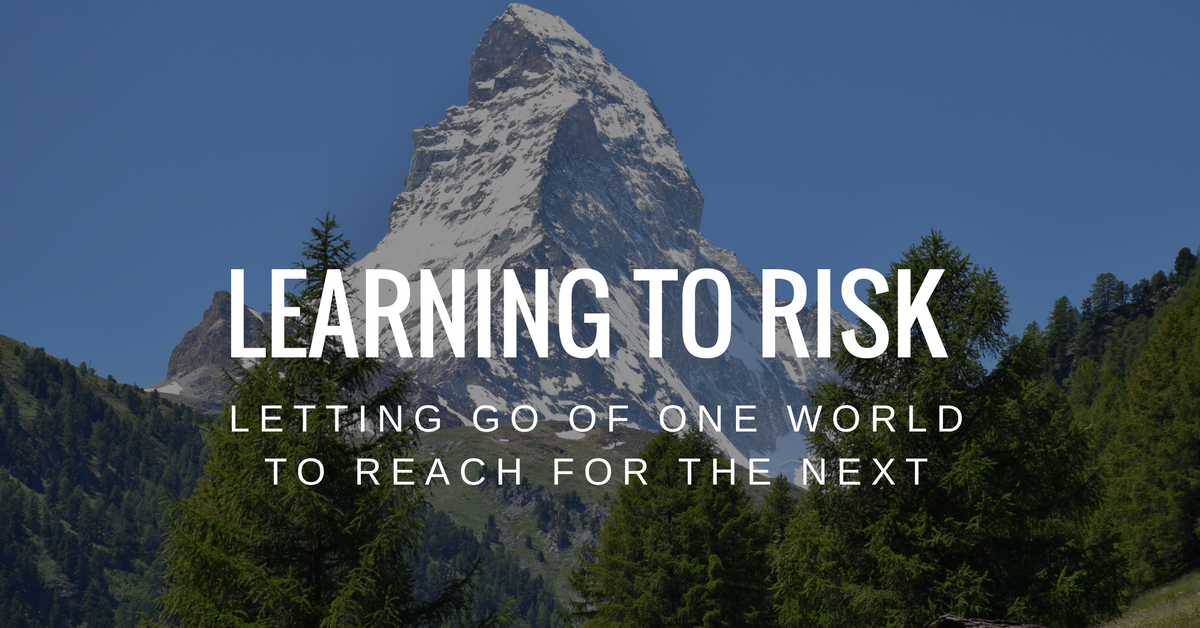
When our spouses died, Donna and I each lost more than a person, we also lost our world as it once was. We grieved for a lost person and we grieved a lost world.
I’ve realized on so many occasions the necessity of letting go of what is behind before reaching for what is ahead. Letting go when you have no choice is one thing, but It’s hard to take a risk when the thing we must release is viable, sustainable, comfortable, and pleasant, and the thing we are reaching for is undeveloped, scary, risky, and unknown.
Throughout life I’ve had dramatic moments of coming to understand that a “bird in the hand” is NOT “worth two in the bush.” Yes, what we hold in our hand is a sure thing, we know what we have, but the “two in the bush”cannot be obtained without letting go of the one in the hand. Unless we let go of what we tightly grip as our present reality, we cannot forge with dedication into our desired future. When God directs the “two in the bush” as his plan, we must first let go of the “one in the hand.”
There comes a defining moment as dramatic in our minds as Indiana Jones reaching for his father’s hand as the earth quaked and the ground opened up. The elder Jones held the Holy Grail in one hand and grasped a quaking ledge with the other. He could not take his son’s hand unless he let go of the Holy Grail, something he sought his entire adult life. He finally let go of his treasure so he could grasp his son’s hand and be pulled to safety.
It’s that moment when we have to actually let go of, release never to grasp again, that which we are moving away from in order to lay hold of that to which we are moving.
How do we know it’s time to loosen the grip on the present and reach for the future? Here are four thoughts that help me.
#1 Build a Boat that Floats
Sometimes leaping into the future is like jumping from a ship in the middle of the ocean without a plan. Most of the time we are admonished not to jump from the ship until we have a boat that floats. If you must take the risk of jumping from the ship, start building a boat. It’s not going to be as accommodating as the ship, but it will be a viable first step in getting you where you need to go.
#2 Mentally Watch the Ripples in the Pond
I think too much, always have. It holds me back because thinking too much hinders necessary risk taking. The key to healthy risk taking is healthy calculation of the risk. When you throw a rock in a pond ripples result. Mentally “throw a rock in the pond and watch the ripples.” Think through worst case scenarios and how you will mitigate them if necessary. You cannot know what will happen and you cannot mitigate all of the risks, but you can think it through and have reasonable contingencies.
#3 Imagine your Deathbed
I specialize in happy thoughts (sarcasm). When I lay on my deathbed will I be glad I took the risk, or will I still think I was stupid in taking the risk? Why the deathbed scenario? It’s because when you are dying you know how it ends. There’s nothing ahead to figure out. It’s all behind. Fast forward to your deathbed and look back. Are you glad you did it? Are you glad you took the risk? Even if your risk blows up, at the end of your days, was it something you just had to go for?
On our sabbatical, on our second to last day in the French Alps Donna and I were discussing whether we would rest, since we did not want to wear ourselves out before moving to the next leg of our journey, or would we hop on a train to Zermatt, Switzerland and experience the Matterhorn. I said, “if we don’t go, at the end of the day, I will be glad we stayed here and rested. If we do go, at the end of the day I will be glad we went.” Donna then made a profound statement, she said, “would you rather be glad that you didn’t go or be glad that you did go.” As is evidenced by the picture with this post, we went.
[shareable]’Would you rather be glad you took the risk, or be glad that you didn’t?'[/shareable]
I pose this question to you, if things are going to turn out positively no matter the path you choose, and if either path is a legitimate life choice, then which path would you rather be glad that you chose.
Trust God, and Trust God in You.
How do I know God’s will for my life? How do I know which path God wants me to walk? Yep, I’ve been asked that question a thousand times, and I’ve asked myself that question 10,000 times. At some point, when we’ve done our best to listen to God, and we’ve sincerely done our best to do the right things, we have to trust God. More than that, we have to trust God in us. We have to trust in God’s ability to guide us and reveal his plan to us.
I’m not sure why God puts the best things in life on the top shelves, but I know that you have to stretch to reach God’s best. Always. Come to grips with your pain points. When the pain of staying is greater than the pain of going, let go.
 Outcomes are not my responsibility. I am at a men’s “prayer summit” this week and I will post a few thoughts from the “summit.” This is some quick hits of things I’m thinking about this week. It is important to pull back from routine regularly and calibrate.
Outcomes are not my responsibility. I am at a men’s “prayer summit” this week and I will post a few thoughts from the “summit.” This is some quick hits of things I’m thinking about this week. It is important to pull back from routine regularly and calibrate.

 Donna and I have both had to walk through a rebuilding of our faith. Our former definition of faith was something like, “believing that God will do anything you direct him to do because you are his favorite person.” Ummm… not exactly… The Scriptures are always quite clear that we are to be seekers of God’s will and not ours—because His plan is better, even when it looks like his plan stinks!
Donna and I have both had to walk through a rebuilding of our faith. Our former definition of faith was something like, “believing that God will do anything you direct him to do because you are his favorite person.” Ummm… not exactly… The Scriptures are always quite clear that we are to be seekers of God’s will and not ours—because His plan is better, even when it looks like his plan stinks!

